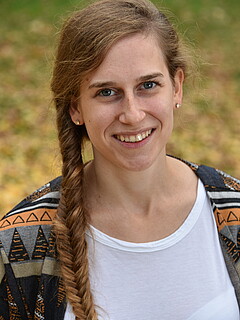PhD students 2nd cohort

Simone Schiesser, M.A. (bis 10/2019)
Friedrich-Schiller-University Jena
Research Training Group "The Romantic Model"
simone.schiesser@uni-jena.de
Curriculum Vitae
Simone Schießer (born 1993) studied German literature and language and communication studies at the University of Jena from 2012 to 2015. She completed a Master’s degree in “Literature – Art – Culture “at the University of Jena with the focus on modern German literature in 2018. During her studies, she worked as a student tutor and research assistant to Dirk von Petersdorff, the Chair of modern German literature. From 2013 to 2015, the “Deutschlandstipendium” foundation funded her studies.
After finishing her studies, the Chair of modern German Literature employed her as a research assistant to the Chair of modern German literature. She has been a PhD student at the ‘Romanticism as a Model’ research training group since October 2018.
PhD project
Updating Romanticism in the 1970s and 80s in the Oeuvre of Sarah Kirsch, Christa Wolf, Sigrid Damm, Peter Handke, and Rolf Dieter Brinkmann
The departure point of this dissertation project is the observation that there was an increase in references to romanticism and the romantic in the German literature of the 1970s and 80s. These references occurred both explicitly by referring to personalities of romanticism, to romanticism itself and implicitly by using romantic ideas and options of literary structure.
These will be explored by looking at the works of Christa Wolf, Sarah Kirsch, Sigrid Damm, Peter Handke, and moRolf Dieter Brinkmann and analysed against the backdrop of different cultural-political and social systems. The project aims to describe precisely, how romanticism and the romantic are modernised in these texts, to understand the reasons for and function of revisiting these romantic patterns and finally to draw a parallel between the results and the individual authors. The differences should be set concerning different social systems. The possible similarities in the reasons and functions of updating the romantic that went beyond the East-West demarcation should discuss if there are more general patterns in modernising the romantic that could serve as explanatory and expressive models for modern societies and individuals in general.